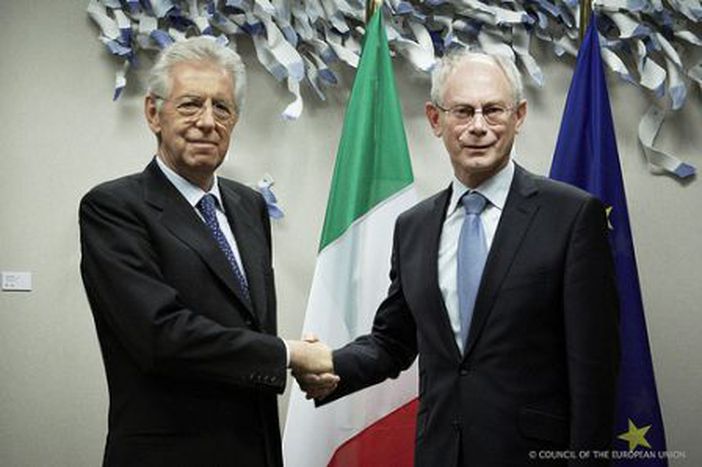
26:1 – A fiscal Union in the European
Published on
By Hans Mund Two figures of the Eurozone safer team: Van Rompuy and Italien's Prime Minister Mario Monti The coming week that starts on Monday 23rd, can be considered as the kick-off for the year 2012 when it comes to EU politics. It will be the first real working week of the Danish Presidency. It is the start of the last 6 months of the first permanent Council Presidency of Herman van Rompuy.
It started with the meeting of the Finance Ministers of the Eurogroup members last Monday, the financial compact drafted and released by Van Rompuy, was discussed. For the Danish presidency, it will be the first test in acting as “the bridge over troubled water”; in itself, it is not a member of the Eurozone , but Prime Minister Helle Thorning-Schmidt and her Minister for European Affairs Nicolai Wammen are aware of what is ahead of them and intend on getting a solution soon.
It became really interesting on Tuesday, January 24th, when the ECOFIN meeting will be held. Since the éclat on December 9th , the British government stayed in contact with the other 26 member states of the Monetary Union to be able to take part in the technical discussion of the new compact. While the UK is trying not to lose the right of co-determination on technical level and the Danish government is trying to hold the Union together, it is the reaction of the Czech the Irish government's reaction on the fiscal compact draft which worry the contracting parties the most. In the light of the urgency and the possibility to effectively develop the fiscal Union, the idea of several referenda is considered to be more of a political threat then an honest commitment to democratic rights of European citizens. Assuming that the financial compact will be accepted by minimum 9 of the Eurozone states, the German Chancellor Angela Merkel and the French President Nicolas Sarkozy are preparing an additional paper , the so-called “six-points-plan“ which shall give a boost to several policy fields through a common action of the contracting parties. The draft of the compact, as well as the Franco-German “six-point plan”, will be the governing topic at EU-Agenda for at least the next 7 days, ending with the Informal Council Meeting on January 30th. At the end of the month, there will be many things to be discussed: concrete measures, like the Financial Transaction Tax , as well as Eurobonds and the European Fiscal Union inside the European Union . However, it is not yet clear whether or not the heads of states are really willing to take important steps towards the fiscal Union , not to mention the political Union. As no-one has yet started to ask what this would actually imply, it will be of utmost importance to keep track for public. Results and outcomes are due to be followed by Cafebabel.



